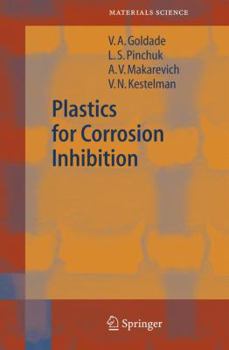Plastics for Corrosion Inhibition
Select Format
Select Condition 
Book Overview
One of the key problems of failure-free operation of machinery is prevention of corrosion. The global scale of modern production makes this problem even more critical. At the beginning of the 21st century industrial contami- tion and the corrosion-active nature of the environment reached a level such that corrosive damage of materials became commensurate with their prod- tion volume and expenditure on anticorrosion protection of machines became comparable with investments in basic production. Anticorrosion techniques changed from being an auxiliary service to industrial enterprises into a dev- oping, scienti?cally intensive and generously ?nanced branch of production. Polymers occupy a very speci?c place amongst anticorrosion techniques. Polymers combine good chemical resistance with impermeability to di?- ent media and unusual deformation characteristics. The main principle of their application as anticorrosion means is the creation of a tight barrier that insulates metal machine parts or constructions from corrosion agents. The advantages of polymers allow the creation of such a barrier at minimal cost, providingprotectionoftheworkingmachinesfromcorrosion, combining their manufacture with preservation and decreasing the cost of anticorrosion. This is one of the main reasons why world production of polymer materials increased by almost 50% in the past decade.
Format:Paperback
Language:English
ISBN:3642062784
ISBN13:9783642062780
Release Date:October 2010
Publisher:Springer
Length:384 Pages
Weight:1.23 lbs.
Dimensions:0.8" x 6.1" x 9.2"
Related Subjects
Engineering Science Science & Math Science & Scientists Science & Technology TechnologyCustomer Reviews
0 rating





